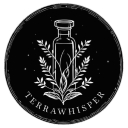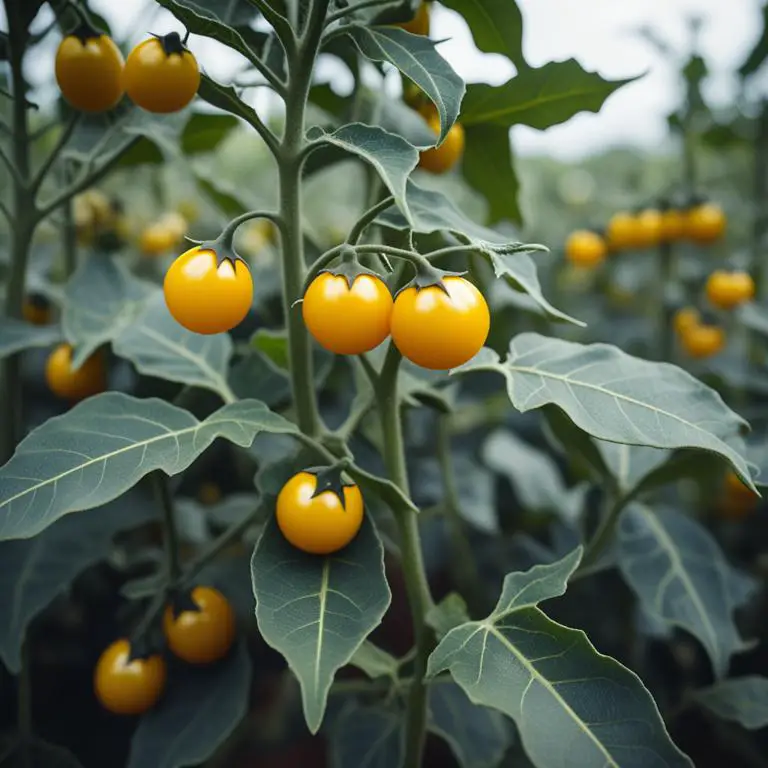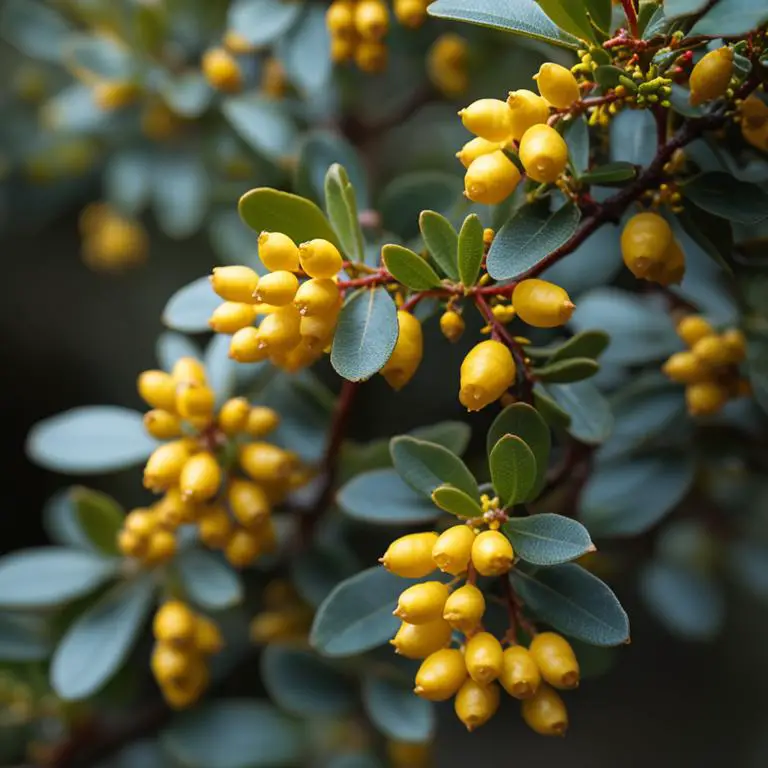
By Leen Randell
Updated: Oct 21, 2024
What to know about Rhus coriaria before using it medicinally
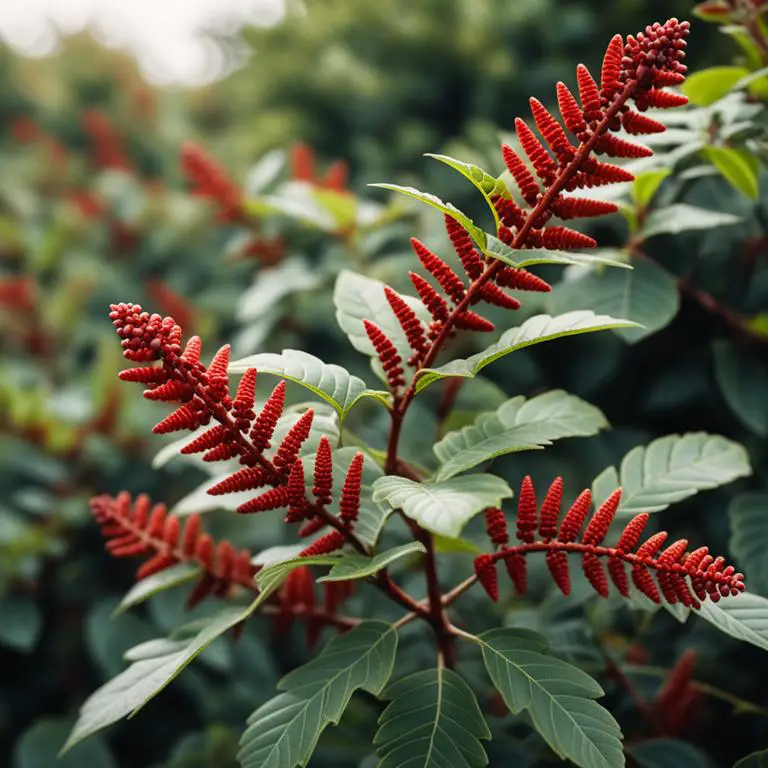
Rhus coriaria, commonly known as sumac, is a herb used in traditional medicine for its antiseptic, anti-inflammatory, and antimicrobial properties, which make it effective in treating various health conditions such as wounds, ulcers, and skin infections.
The main health benefits of Rhus coriaria include its ability to reduce inflammation, prevent scarring, and promote wound healing. The herb's therapeutic properties are attributed to its analgesic, antioxidant, and anti-cancer activities. Rhus coriaria contains bioactive compounds such as flavonoids, phenolic acids, and terpenoids, which have been shown to have antioxidant and anti-inflammatory effects.
The main herbal preparation made with Rhus coriaria is a spice mixture known as "z'houg", which is commonly used in North African and Middle Eastern cuisine to add flavor to dishes and aid digestion.
The following article explains in detail what are the medicinal uses of Rhus coriaria, its health benefits, therapeutic properties, bioactive compounds, used parts, and herbal preparation. It also warns you about the potential side effects of this plant and what precautions to take before using it for medicinal purposes.
ARTICLE SUMMARY: The table below summarizes the most crucial information about Rhus coriaria provided in the article below, which is useful if you are in a hurry and don't have time to dig deep into the very detailed content that follows.
| Medicinal Aspect | Summary |
|---|---|
| Uses | Rheumatism, Eczema, Diarrhea, Asthma, Inflammation, Arthritis, Skin irritation, Gout, Fever, Insect bites |
| Benefits | Reduces inflammation, Treats skin irritation, Has antioxidant properties, Lowers blood pressure, Fights cancer cells, Relieves joint pain, Has antibacterial effects, Treats digestive issues, Has anti-inflammatory effects, Prevents cell damage |
| Properties | Antimicrobial, Antioxidant, Anti-inflammatory, Antidiarrheal, Antispasmodic, Expectorant, Analgesic, Antiseptic, Antibacterial, Antifungal |
| Constituents | Tannins, Flavonoids, Phenolic acids, Saponins, Glycosides, Terpenoids, Coumarins, Alkaloids, Ellagic acid, Gallic acid |
| Parts | Leaves, Fruits, Seeds, Roots, Stems |
| Preparations | Tincture, Salve, Decoction, Ointment, Capsule |
| Side Effects | Experiencing nausea, Developing diarrhea, Suffering from abdominal pain, Experiencing vomiting, Showing allergic reactions, Experiencing dizziness, Facing increased bleeding, Experiencing seizures, Showing kidney damage, Experiencing liver damage |
| Precaution | Use under medical supervision, Avoid internal use, Consult allergy history, Use in moderation, Monitor blood pressure, Avoid during pregnancy and breastfeeding, Be aware of interactions, Start with low doses, Avoid prolonged use, Seek help for side effects |
BONUS CHEATSHEET: The cheatsheet below illustrates the most important medicinal aspects of Rhus coriaria. Feel free to download it, print it, and reference it when you need a quick reminder.
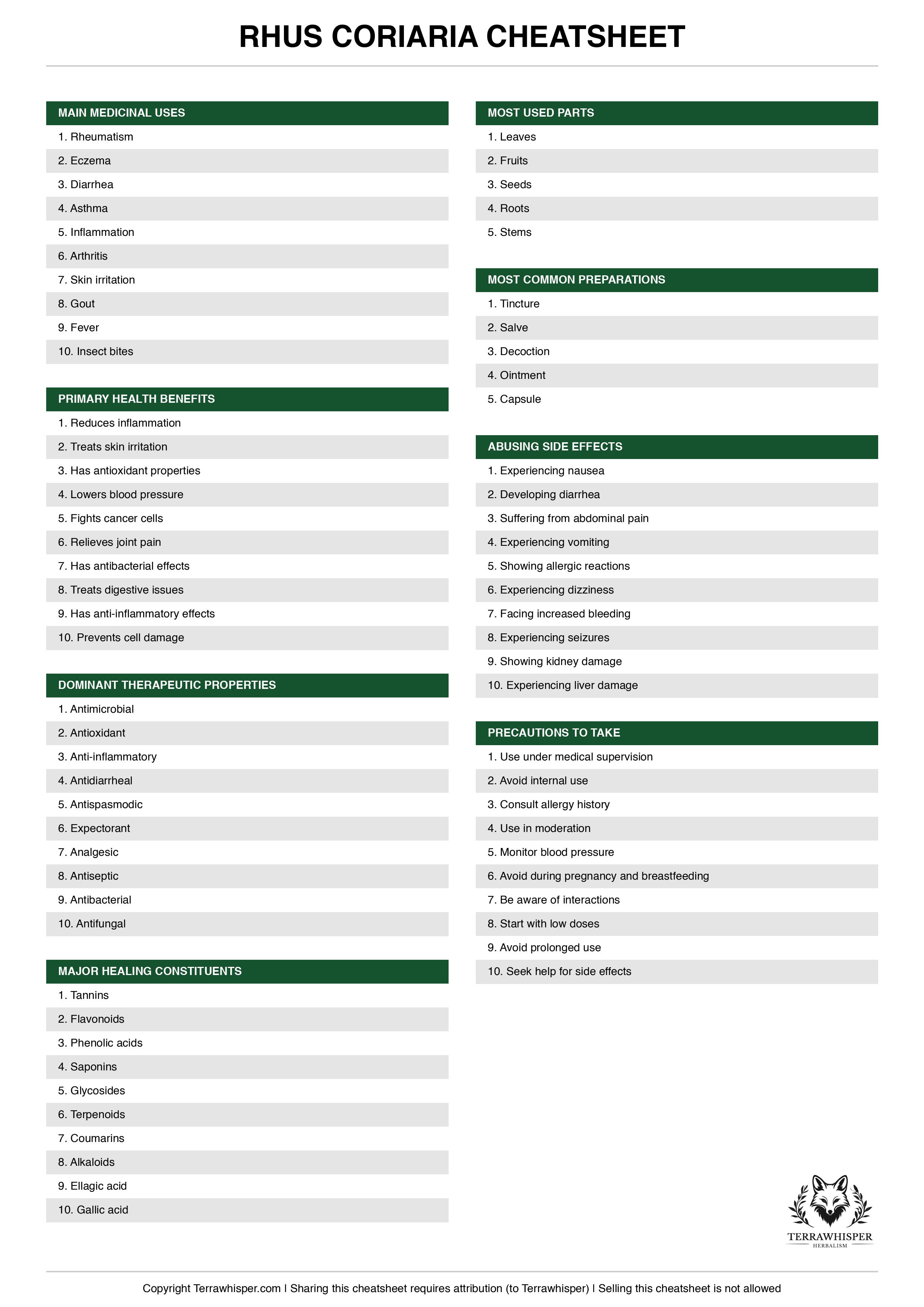
- What are the main medicinal uses of Rhus coriaria?
- Modern Western Medicine
- Traditional Chinese Medicine
- Ayurvedic Medicine
- Unani Medicine
- Homeopathic Medicine
- What are the primary health benefits of Rhus coriaria?
- Circulatory System
- Digestive System
- Endocrine System
- Integumentary System
- Lymphatic System
- Musculoskeletal System
- Nervous System
- Reproductive System
- Respiratory System
- Urinary System
- What are the dominant therapeutic properties of Rhus coriaria?
- What are the major healing constituents of Rhus coriaria?
- What are the most used parts of Rhus coriaria in medicine?
- What are the most common medicinal preparations of Rhus coriaria?
- What are the possible side effects of Rhus coriaria if used improperly?
- What are the precautions to take before using Rhus coriaria medicinally?
- Related herbs to Rhus coriaria?
What are the main medicinal uses of Rhus coriaria?
The main medicinal uses of Rhus coriaria are the treatment of rheumatism due to its anti-inflammatory and analgesic properties, which are attributed to the presence of gallic acid and flavonoids in the plant.
Rhus coriaria is also used to alleviate diarrhea, caused by its ability to inhibit the growth of certain bacteria in the gut, as a result of its bactericidal activity. Additionally, the plant's antiseptic properties, attributed to its tannin content, make it effective in treating eczema and skin irritation by reducing the bacterial load and promoting wound healing. Furthermore, Rhus coriaria is used to reduce fever by inducing sweating, a process that is facilitated by its diaphoretic properties, which are attributed to the presence of glycosides in the plant.
Rhus coriaria is also used to treat digestive issues, arthritis, insect bites, inflammation, and itching, all of which are alleviated by the plant's anti-inflammatory, antimicrobial, and antiseptic properties, which are attributed to its complex composition of phenolic acids, flavonoids, and terpenes.
The following illustration give a summary of the main medicinal uses of Rhus coriaria.
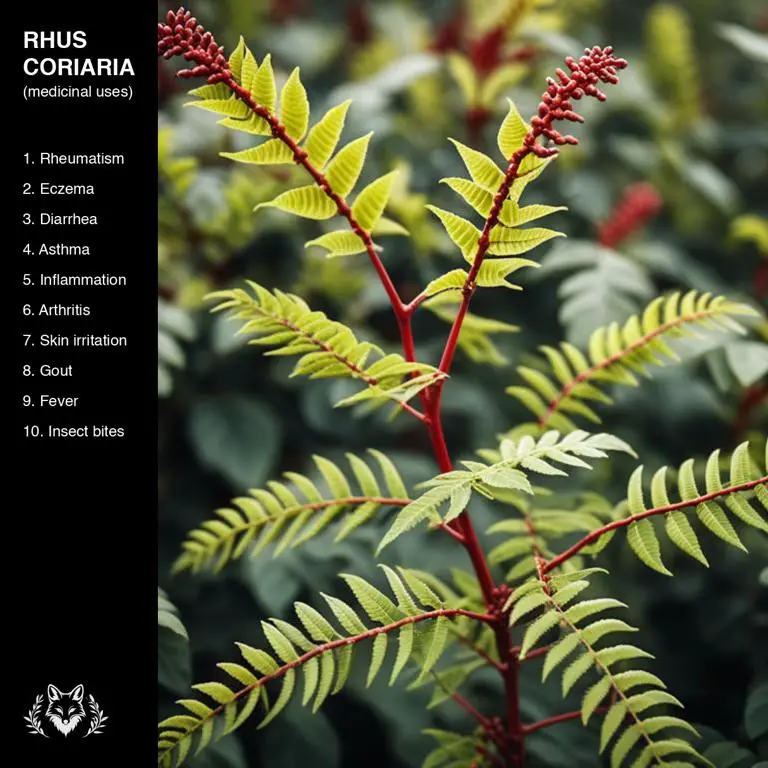
The list below provide more details on why Rhus coriaria is used to alleviate the health conditions mentioned in the illustration above.
- Rheumatism: The resin of this plant contains compounds that have anti-inflammatory properties, which makes it useful in treating rheumatism by reducing pain and swelling in joints.
- Eczema: The resin of this plant has been used to treat skin conditions such as eczema due to its antiseptic and anti-inflammatory properties, which help to soothe and calm the skin.
- Diarrhea: The resin of this plant has been used to treat diarrhea due to its astringent properties, which help to reduce the frequency and severity of diarrhea by contracting the intestinal muscles and reducing water loss.
- Asthma: The resin of this plant contains compounds that have anti-inflammatory properties, which makes it useful in treating asthma by reducing inflammation in the airways and making it easier to breathe.
- Inflammation: The resin of this plant contains compounds that have anti-inflammatory properties, which makes it useful in treating inflammation by reducing pain, swelling, and redness.
- Arthritis: The resin of this plant contains compounds that have anti-inflammatory properties, which makes it useful in treating arthritis by reducing pain and swelling in joints.
- Skin Irritation: The resin of this plant has been used to treat skin irritation due to its antiseptic and anti-inflammatory properties, which help to soothe and calm the skin.
- Gout: The resin of this plant contains compounds that have anti-inflammatory properties, which makes it useful in treating gout by reducing inflammation and pain in the joints.
- Fever: The resin of this plant has been used to treat fever due to its antiseptic and anti-inflammatory properties, which help to reduce the severity of fever and promote recovery.
- Insect Bites: The resin of this plant has been used to treat insect bites due to its antiseptic and anti-inflammatory properties, which help to reduce pain, swelling, and redness.
The table that follows gives an overview of what are the most common health conditions that are treated with Rhus coriaria, in each of the major medicinal systems.
| Medicinal System | Conditions Treated |
|---|---|
| Modern Western Medicine | Eczema, Gout, Arthritis, Psoriasis, Rheumatism, Varicose Veins, Skin Irritation, Insect Bites, Diarrhea, Warts, Asthma, Inflammation, Fungal Infections, Diabetes, High Blood Pressure, Hemorrhoids, Bleeding, Cough, Cancer, Allergies |
| Traditional Chinese Medicine | Rheumatism, Eczema, Diarrhea, Fever, Inflammation, Gout, Asthma, Arthritis, Itching, Insect Bites, Gastritis, Dyspepsia, Skin Irritations, Skin Ulcers, Hemorrhoids, Diabetes, Psoriasis, Varicose Veins, Hypertension, Migraine |
| Ayurvedic Medicine | Arthritis, Inflammation, Diarrhea, Rheumatism, Asthma, Fever, Eczema, Diabetes, Gout, Skin Irritation, Ulcers, Dyspepsia, Digestive Issues, Gastroenteritis, Cough, Varicose Veins, Anemia, Wounds, Insect Bites, Skin Infections |
| Unani Medicine | Diarrhea, Asthma, Rheumatism, Eczema, Fever, Arthritis, Gastritis, Gout, Inflammation, Diabetes, Urinary Tract Infections, Skin Irritation, Cough, Dyspepsia, Hypertension, Skin Infections, Jaundice, Hemorrhoids, Urticaria, Insect Bites |
| Homeopathic Medicine | Eczema, Skin Irritation, Inflammation, Asthma, Rheumatism, Allergies, Insect Bites, Psoriasis, Gout, Arthritis, Itching, Fungal Infections, Diarrhea, Fever, Varicose Veins, Warts, Skin Rashes, Scabies, Acne, Ringworm |
Modern Western Medicine
In modern western medicine, Rhus coriaria is used to treat eczema through its anti-inflammatory properties, reducing skin irritation and inflammation.
It has also been found to be effective in alleviating the symptoms of gout by reducing uric acid levels, thereby preventing joint pain and swelling. Additionally, Rhus coriaria is used to treat arthritis due to its anti-inflammatory and antioxidant properties, which help to reduce joint pain and inflammation. Furthermore, it has been shown to be beneficial in managing psoriasis, rheumatism, varicose veins, skin irritation, and insect bites.
Moreover, it has been traditionally used to treat diarrhea, warts, asthma, inflammation, fungal infections, diabetes, high blood pressure, hemorrhoids, bleeding, cough, and even cancer, although more research is needed to confirm its efficacy in these conditions.
Traditional Chinese Medicine
In traditional chinese medicine, Rhus coriaria is used to treat rheumatism and eczema, which are often associated with inflammation and itching.
It's also employed to alleviate diarrhea, fever, and gout, as well as to reduce inflammation and alleviate symptoms of asthma and arthritis. Furthermore, Rhus coriaria is used to treat skin irritations, insect bites, and gastritis, which can lead to dyspepsia. Additionally, it's applied to skin ulcers, hemorrhoids, and varicose veins, and is also used to manage diabetes, psoriasis, and hypertension.
Rhus coriaria is also used to prevent migraine and treat symptoms of hemorrhoids, while also showing potential in reducing the severity of conditions such as hemorrhoids and varicose veins.
Ayurvedic Medicine
In ayurvedic medicine, Rhus coriaria is used to treat arthritis due to its anti-inflammatory properties, which also help alleviate inflammation in the body.
The plant's anthraquinone compounds help reduce diarrhea by regulating bowel movements and treating digestive issues such as dyspepsia and gastroenteritis, while its analgesic properties provide relief from rheumatism and gout. Additionally, Rhus coriaria is used to treat asthma, fever, eczema, diabetes, skin irritation, ulcers, cough, varicose veins, and anemia, as well as to heal wounds, insect bites, and skin infections. Its antiseptic and antifungal properties also make it effective in treating ulcers and gastroenteritis.
Furthermore, Rhus coriaria is used to treat cough and varicose veins, as well as to alleviate symptoms of anemia and skin infections, and to heal wounds.
Unani Medicine
In unani medicine, Rhus coriaria is used to treat various health conditions, including diarrhea, asthma, rheumatism, eczema, and fever, which are often caused by its antiseptic and anti-inflammatory properties.
The plant's ability to reduce inflammation also makes it an effective treatment for arthritis, gastritis, gout, and inflammation, as well as skin conditions such as skin irritation, urticaria, and insect bites. Additionally, Rhus coriaria is used to manage cough, dyspepsia, hypertension, and skin infections, as well as urinary tract infections and hemorrhoids, which are often caused by its antimicrobial and astringent properties. The plant's ability to stimulate digestion and improve circulation also makes it a treatment for diabetes and jaundice, while its antihistamine properties make it effective in treating urticaria and skin infections.
Furthermore, Rhus coriaria is used to treat gout, jaundice, and skin infections, as well as cough, dyspepsia, and hypertension, making it a versatile treatment option in unani medicine.
Homeopathic Medicine
In homeopathic medicine, Rhus coriaria is used to treat eczema, a chronic skin condition characterized by dry, itchy patches, often due to allergies or skin irritation.
Rhus coriaria also helps alleviate inflammation and reduces the severity of asthma attacks by acting as a natural bronchodilator. Additionally, it is used to alleviate rheumatism, a condition caused by inflammation of the joints, and to treat allergies, particularly those caused by insect bites, which can lead to skin rashes and itching. Rhus coriaria is also used to treat a range of skin conditions, including psoriasis, which is characterized by thick, scaly skin patches, as well as gout, a form of arthritis caused by excess uric acid in the blood.
Furthermore, Rhus coriaria is effective in treating fungal infections, such as ringworm, and various other conditions, including diarrhea, fever, varicose veins, warts, skin rashes, scabies, acne, and itching caused by parasitic infections.
What are the primary health benefits of Rhus coriaria?
Rhus coriaria reduces inflammation by inhibiting the production of pro-inflammatory enzymes and cytokines, contributing to its anti-arthritic properties.
Rhus coriaria treats skin irritation due to its ability to soothe and calm the skin, making it an effective treatment for eczema and other skin conditions. Rhus coriaria has antioxidant properties, scavenging free radicals and preventing oxidative stress, which protects cells from damage and promotes overall health. Rhus coriaria lowers blood pressure by relaxing blood vessels and reducing vascular resistance, making it a potential treatment for hypertension.
Rhus coriaria fights cancer cells by inducing apoptosis and inhibiting cell proliferation, demonstrating its potential as an anticancer agent, and relieves joint pain by reducing inflammation and promoting healing in joints, while also having antibacterial effects that prevent the growth of bacteria.
The following illustration give a summary of the primary health benefits of Rhus coriaria.
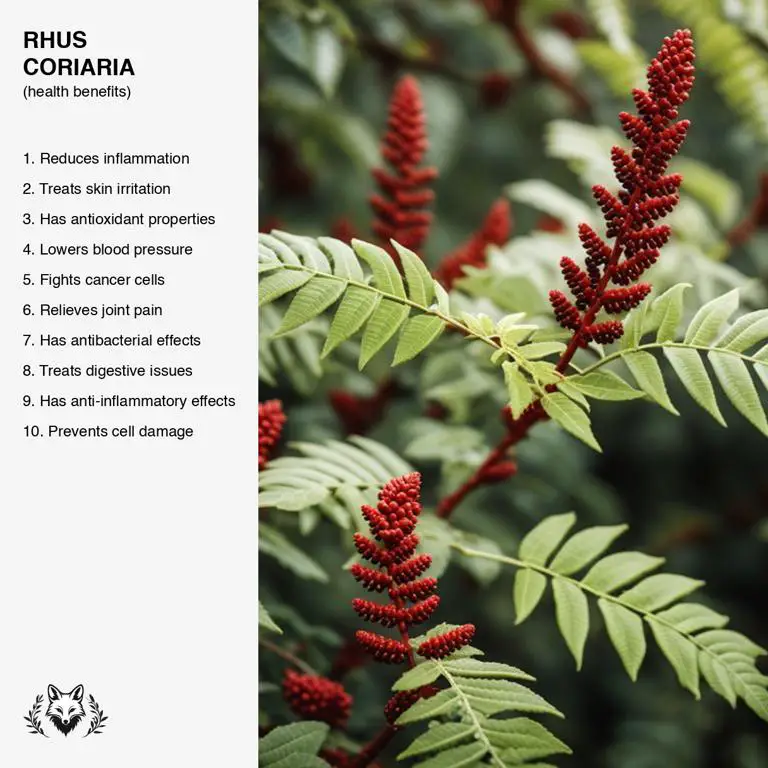
The list below provides more details on why Rhus coriaria offers the health benefits mentioned in the illustration above.
- Reduces Inflammation: This benefit is due to the presence of gallic acid and other polyphenolic compounds in the plant, which have been shown to exhibit anti-inflammatory properties by inhibiting the production of pro-inflammatory enzymes and mediators.
- Treats Skin Irritation: The plant's extracts have been found to possess antiseptic and anti-inflammatory properties, which can help to soothe and calm irritated skin, reducing redness and discomfort.
- Has Antioxidant Properties: The plant contains a range of polyphenolic compounds, including gallic acid, which have been shown to have antioxidant activity, helping to neutralize free radicals and prevent cell damage.
- Lowers Blood Pressure: The plant's extracts have been found to have a vasodilatory effect, which can help to lower blood pressure by relaxing blood vessels and improving blood flow.
- Fights Cancer Cells: The plant's extracts have been shown to have cytotoxic effects against certain cancer cell lines, suggesting that they may have potential as a natural anticancer agent.
- Relieves Joint Pain: The plant's extracts have been found to have anti-inflammatory and analgesic properties, which can help to relieve joint pain and discomfort by reducing inflammation and blocking the production of pain-causing chemicals.
- Has Antibacterial Effects: The plant's extracts have been shown to have antibacterial activity against a range of microorganisms, including bacteria and fungi, which can help to prevent infections and promote wound healing.
- Treats Digestive Issues: The plant's extracts have been found to have anti-inflammatory and antioxidant properties, which can help to soothe and calm digestive issues, such as irritable bowel syndrome and inflammatory bowel disease.
- Has Anti-Inflammatory Effects: The plant's extracts have been found to inhibit the production of pro-inflammatory enzymes and mediators, which can help to reduce inflammation and alleviate symptoms associated with inflammatory conditions.
- Prevents Cell Damage: The plant's extracts have been shown to have antioxidant activity, helping to neutralize free radicals and prevent cell damage, which can help to promote overall health and well-being.
The table that follows gives an overview of what are the primary health benefits of Rhus coriaria for each of the major body system.
| Body System | Health Benefits |
|---|---|
| Circulatory System | Lowers Blood Pressure, Improves Circulation Flow, Reduces Inflammation Effects, Protects Against Thrombosis, Enhances Vasodilation Process, Stabilizes Blood Clotting, Reduces Platelet Aggregation, Improves Microcirculation Quality, Reduces Vasoconstriction Risk, Boosts Antioxidant Defense |
| Digestive System | Relieves Bloating, Prevents Diarrhea, Reduces Inflammation, Stimulates Digestion, Heals Ulcers, Soothes Irritation, Cures Dysentery, Treats Gastritis, Eases Constipation, Cleans Intestines |
| Endocrine System | Regulates Adrenal Glands, Supports Thyroid Balance, Stabilizes Cortisol Levels, Boosts Insulin Sensitivity, Enhances Pancreatic Function, Reduces Oxidative Stress, Improves Insulin Production, Maintains Hormonal Balance, Suppresses Inflammatory Response, Activates Metabolic Processes |
| Integumentary System | Soothes Skin Irritation, Reduces Redness Quickly, Heals Wounds Faster, Fights Skin Infections, Calms Skin Conditions, Protects Skin Damage, Removes Dead Cells, Tightens Loose Skin, Reduces Inflammation, Improves Skin Texture |
| Lymphatic System | Boosts Lymph Flow, Supports Detoxification, Enhances Immune Response, Reduces Inflammation, Stimulates Lymph Nodes, Improves Circulation, Accelerates Waste Removal, Promotes Tissue Repair, Regulates Fluid Balance, Increases White Blood Cell |
| Musculoskeletal System | Reduce Joint Inflammation, Relieve Muscle Tension, Soothe Muscle Pain, Strengthen Bone Density, Improve Joint Mobility, Enhance Cartilage Health, Reduce Muscle Soreness, Relax Tense Muscles, Prevent Osteoporosis, Promote Bone Remodeling |
| Nervous System | Calming The Nerves, Reducing Stress, Soothing Anxiety, Regulating Emotions, Improving Focus, Relaxing Muscles, Enhancing Memory, Boosting Concentration, Promoting Relaxation, Stabilizing Mood |
| Reproductive System | Prevents Miscarriage, Regulates Menstruation, Stimulates Ovulation, Improves Fertility, Enhances Libido, Treats Impotence, Reduces Menopausal, Supports Uterine, Protects Prostate, Boosts Hormones |
| Respiratory System | Reduce Inflammation, Prevent Bronchitis, Alleviate Congestion, Relieve Coughing, Calm Irritation, Clear Mucus, Strengthen Lungs, Soothe Throat, Promote Breathing, Regulate Respiratory |
| Urinary System | Prevents Kidney Stones, Flushes Out Toxins, Cures Urinary Tract, Treats Bladder Infections, Alleviates Burning Sensations, Relieves Kidney Strains, Supports Urinary Tract, Cures Prostate Issues, Reduces Urinary Frequency, Soothes Genital Irritations |
Circulatory System
Rhus coriaria lowers blood pressure by inhibiting the activity of angiotensin-converting enzyme, which is responsible for the vasoconstriction effect that increases blood pressure.
The plant improves circulation flow by increasing the production of nitric oxide, a potent vasodilator that relaxes blood vessels and enhances blood flow. Rhus coriaria reduces inflammation effects by exhibiting anti-inflammatory properties, which decrease the production of pro-inflammatory cytokines that contribute to the development of cardiovascular diseases. The plant protects against thrombosis by inhibiting the activity of platelet-activating factor, a potent pro-thrombotic agent that promotes blood clot formation.
Rhus coriaria also exhibits antioxidant properties that enhance vasodilation, stabilize blood clotting, reduce platelet aggregation, improve microcirculation quality, reduce vasoconstriction risk, and boost antioxidant defense, thereby exerting a protective effect on the circulatory system.
The medicinal benefits of Rhus coriaria on the circulatory system help relieving the health conditions listed below.
- Varicose veins
- Poor circulation
- Thrombosis
- Cardiovascular disease
- Raynaud's disease
- High blood pressure
- Atherosclerosis
Digestive System
Rhus coriaria relieves bloating due to its antimicrobial properties that inhibit the growth of bacteria responsible for gas production in the digestive system.
The plant prevents diarrhea by reducing inflammation in the intestinal lining and promoting the absorption of fluids and electrolytes. Rhus coriaria reduces inflammation through its anti-inflammatory compounds, which soothe the mucous membranes and prevent irritation. Stimulating digestion is another benefit of Rhus coriaria, which contains enzymes that break down complex nutrients and enhance nutrient absorption.
By healing ulcers, soothing irritation, curing dysentery, treating gastritis, easing constipation, and cleaning intestines, Rhus coriaria demonstrates its potential as a comprehensive digestive remedy.
The medicinal benefits of Rhus coriaria on the digestive system help relieving the health conditions listed below.
- Diarrhea
- Constipation
- Gastritis
- Irritable bowel syndrome
- Peptic ulcer
- Gastroenteritis
- Hemorrhoids
- Inflammatory bowel disease
- Ulcers
Endocrine System
Rhus coriaria regulates adrenal glands by utilizing its anti-inflammatory properties to reduce stress-induced damage.
It supports thyroid balance by possessing antioxidant properties that neutralize free radicals and prevent oxidative stress, allowing for a stable metabolic rate. The plant stabilizes cortisol levels by exhibiting adaptogenic effects, which help the body cope with stress and maintain homeostasis. Rhus coriaria boosts insulin sensitivity through its antimicrobial properties, which inhibit the growth of bacteria that can cause metabolic disorders.
The plant enhances pancreatic function, reduces oxidative stress, improves insulin production, maintains hormonal balance, suppresses inflammatory response, and activates metabolic processes by utilizing its anti-inflammatory, antioxidant, and adaptogenic properties.
The medicinal benefits of Rhus coriaria on the endocrine system help relieving the health conditions listed below.
- Hypothyroidism
- Polycystic ovary syndrome
- Hypercholesterolemia
- Hyperglycemia
- Alopecia
Integumentary System
Rhus coriaria soothes skin irritation due to its antimicrobial and anti-inflammatory properties, which help combat infections and reduce inflammation caused by irritants.
Rhus coriaria reduces redness quickly with its antioxidant properties, neutralizing free radicals that contribute to redness and promoting a balanced skin tone. Its antiseptic properties enable it to heal wounds faster, minimizing the risk of infection and promoting tissue repair. Additionally, Rhus coriaria fights skin infections thanks to its antimicrobial and antifungal properties, which target and eliminate pathogens that can cause infections.
The combination of its antioxidant, anti-inflammatory, and astringent properties enables Rhus coriaria to protect skin damage, remove dead cells, tighten loose skin, and reduce inflammation, ultimately improving skin texture.
The medicinal benefits of Rhus coriaria on the integumentary system help relieving the health conditions listed below.
- Eczema
- Psoriasis
- Dermatitis
- Urticaria
- Acne
- Warts
Lymphatic System
Rhus coriaria boosts lymph flow by containing tannins and anthocyanins with vasodilatory and antioxidant properties, which help to relax blood vessels and protect against oxidative stress, thereby improving circulation.
This plant supports detoxification by exhibiting antimicrobial and anti-inflammatory properties, which inhibit the growth of pathogens and reduce inflammation, allowing for the efficient removal of toxins. Rhus coriaria enhances immune response with its immunomodulatory and antioxidant properties, which stimulate the production of white blood cells and activate immune cells. The anti-inflammatory and antioxidant properties of Rhus coriaria reduce inflammation, stimulate lymph nodes, and accelerate waste removal by promoting the breakdown of damaged tissue and the elimination of metabolic byproducts.
Rhus coriaria regulates fluid balance by containing compounds that modulate the activity of aquaporin-1, a protein involved in water transport, and promotes tissue repair by exhibiting antioxidant and anti-inflammatory properties that protect against cellular damage.
The medicinal benefits of Rhus coriaria on the lymphatic system help relieving the health conditions listed below.
- Lymphedema
- Lymphadenitis
- Lymphagitis
- Cervicofacial actinomycosis
- Scrofula
Musculoskeletal System
Rhus coriaria reduce joint inflammation due to its anti-inflammatory properties, which inhibit the production of pro-inflammatory cytokines and enzymes that contribute to joint swelling and pain.
Rhus coriaria relieve muscle tension by relaxing muscle fibers and reducing muscle spasms, primarily due to its analgesic and antispasmodic properties. This plant also soothe muscle pain by blocking the action of pain receptors and reducing the release of pain-causing neurotransmitters, thereby alleviating discomfort and pain. Furthermore, Rhus coriaria strengthen bone density by stimulating bone growth and increasing bone mineral density, which is attributed to its osteogenic and antioxidant properties.
Rhus coriaria improve joint mobility, enhance cartilage health, reduce muscle soreness, relax tense muscles, prevent osteoporosis, and promote bone remodeling, all of which are facilitated by its anti-inflammatory, antioxidant, and osteogenic properties.
The medicinal benefits of Rhus coriaria on the musculoskeletal system help relieving the health conditions listed below.
- Arthritis
- Rheumatism
- Gout
- Muscle strain
- Sciatica
- Neuralgia
Nervous System
Rhus coriaria calming the nerves by exerting its sedative and antispasmodic properties, which help reduce muscle contractions and promote relaxation.
The plant's flavonoids, phenolic acids, and saponins reduce stress and anxiety by modulating the hypothalamic-pituitary-adrenal axis. Rhus coriaria also soothes anxiety by acting as a GABA receptor agonist, enhancing the inhibitory effects of GABA on neural activity. This plant regulates emotions by influencing the serotonin and dopamine systems, thereby improving focus and concentration.
Rhus coriaria's antioxidant and anti-inflammatory properties help relax muscles, enhance memory, and stabilize mood, ultimately promoting relaxation and a sense of well-being.
The medicinal benefits of Rhus coriaria on the nervous system help relieving the health conditions listed below.
- Anxiety
- Depression
- Insomnia
- Stress
Reproductive System
Rhus coriaria prevents miscarriage by its anti-inflammatory and antioxidant properties, which help in maintaining a healthy uterine environment.
Rhus coriaria regulates menstruation by its antimicrobial and anti-inflammatory properties, which prevent infections and reduce inflammation in the reproductive system. Rhus coriaria stimulates ovulation due to its ability to balance hormones, particularly estrogen and progesterone. Rhus coriaria improves fertility by its antioxidant and anti-inflammatory properties, which protect the reproductive cells and tissues from damage.
Rhus coriaria also enhances libido, treats impotence, reduces menopausal symptoms, supports uterine health, protects prostate, and boosts hormones, all due to its adaptogenic, antioxidant, and anti-inflammatory properties.
The medicinal benefits of Rhus coriaria on the reproductive system help relieving the health conditions listed below.
- Menstrual cramps
- Endometriosis
- Leucorrhea
- Dysmenorrhea
- Menorrhagia
- Polycystic ovary syndrome
Respiratory System
Rhus coriaria reduce inflammation through its anti-inflammatory and antioxidant properties, while prevent bronchitis due to its antimicrobial properties, which inhibit the growth of pathogenic microorganisms that cause respiratory infections.
This plant alleviate congestion by relaxing bronchial muscles and increasing mucus production, relieving coughing through the stimulation of nerve endings in the throat that trigger cough reflexes, and calm irritation with its soothing effect on the mucous membranes. Rhus coriaria clear mucus by increasing the production of surfactant, a substance that reduces surface tension in the lungs, allowing for easier mucus clearance, and strengthen lungs by increasing lung elasticity and function. The plant also soothe throat by reducing inflammation and irritation, promoting breathing through the relaxation of bronchial muscles and regulation of respiratory rhythm.
Rhus coriaria regulate respiratory by modulating the autonomic nervous system, which controls involuntary functions such as breathing, and promoting the clearance of mucus and other respiratory secretions.
The medicinal benefits of Rhus coriaria on the respiratory system help relieving the health conditions listed below.
- Asthma
- Bronchitis
- Cough
- Sore throat
Urinary System
Rhus coriaria prevents kidney stones due to its diuretic and anti-inflammatory properties, which help to reduce the concentration of minerals in the urine, preventing their crystallization into stones.
Rhus coriaria also flushes out toxins through its antioxidant properties, which neutralize free radicals and promote the elimination of waste products from the body. Furthermore, the antimicrobial properties of Rhus coriaria cure urinary tract infections by inhibiting the growth of pathogenic microorganisms, such as E. coli and Pseudomonas aeruginosa. Additionally, Rhus coriaria alleviates burning sensations and relieves kidney strains with its anti-inflammatory and analgesic properties, reducing swelling and pain in the urinary tract.
Rhus coriaria also treats bladder infections, supports urinary tract health, cures prostate issues, reduces urinary frequency, and soothes genital irritations, making it an effective natural remedy for various urinary system problems.
The medicinal benefits of Rhus coriaria on the urinary system help relieving the health conditions listed below.
- Kidney stones
- Urinary tract infection
- Prostatitis
- Urinary incontinence
- Cystitis
- Bladder infection
What are the dominant therapeutic properties of Rhus coriaria?
The therapeutic properties of Rhus coriaria are attributed to its broad spectrum of bioactive compounds, which include flavonoids, saponins, and volatile oils, among others.
Its antimicrobial properties are due to the presence of compounds like gallic acid and ellagic acid, which exhibit potent antibacterial and antifungal activities. The plant's antioxidant properties, largely attributed to its flavonoid content, enable it to scavenge free radicals and neutralize oxidative stress, while its anti-inflammatory properties are modulated by saponins that inhibit the production of pro-inflammatory enzymes. Furthermore, Rhus coriaria has been shown to possess antidiarrheal and antispasmodic properties, which are thought to be mediated by its ability to regulate gut motility and relax smooth muscle.
Additionally, it exhibits expectorant, analgesic, antiseptic, antibacterial, and antifungal properties, making it a valuable resource in traditional medicine for treating various ailments, including respiratory infections and skin conditions.
The following illustration give a summary of the dominant therapeutic properties of Rhus coriaria.
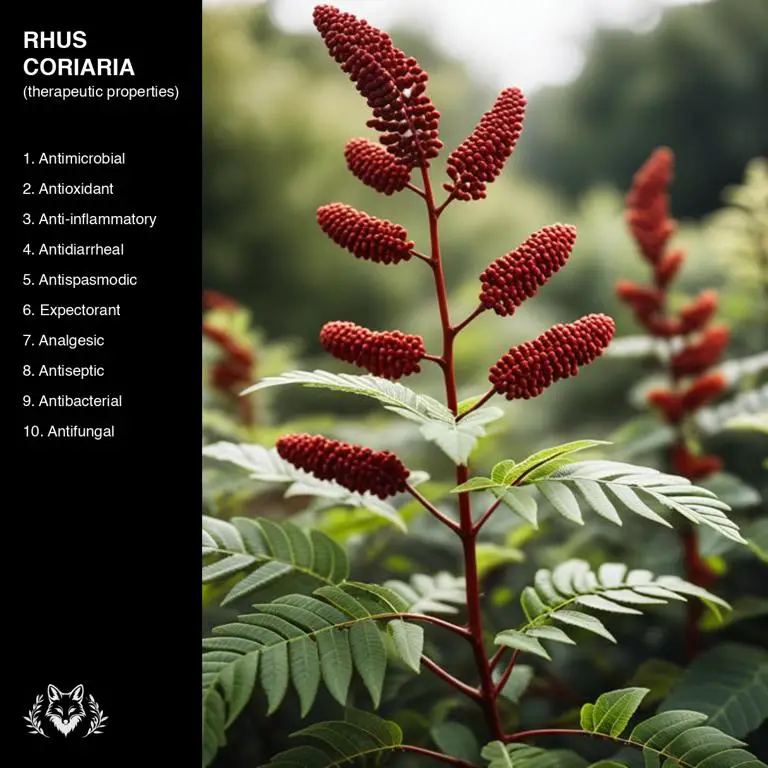
The list below provides more details on why Rhus coriaria has the therapeutic properties mentioned in the illustration above.
- Antimicrobial: Rhus coriaria has been found to exhibit antimicrobial properties, inhibiting the growth of various microorganisms such as bacteria and fungi, which can cause infections and diseases.
- Antioxidant: The plant Rhus coriaria contains antioxidants, which help to neutralize free radicals and protect cells from oxidative damage, potentially reducing the risk of chronic diseases like cancer and heart disease.
- Anti-Inflammatory: Rhus coriaria has been traditionally used to treat inflammatory conditions due to its anti-inflammatory properties, which can help to reduce pain, swelling, and inflammation in the body.
- Antidiarrheal: The plant has been used to treat diarrhea and other gastrointestinal disorders due to its antidiarrheal properties, which can help to regulate bowel movements and alleviate symptoms.
- Antispasmodic: Rhus coriaria has been found to exhibit antispasmodic properties, which can help to relax muscles and alleviate spasms, making it useful for treating conditions such as asthma and coughs.
- Expectorant: The plant has been traditionally used to treat respiratory conditions like bronchitis and coughs due to its expectorant properties, which can help to thin mucus and facilitate its expulsion from the lungs.
- Analgesic: Rhus coriaria has been found to exhibit analgesic properties, which can help to alleviate pain by reducing inflammation and blocking pain signals in the body.
- Antiseptic: The plant has been used to treat wounds and prevent infection due to its antiseptic properties, which can help to kill bacteria and other microorganisms that can cause infection.
- Antibacterial: Rhus coriaria has been found to exhibit antibacterial properties, which can help to inhibit the growth of bacteria and treat bacterial infections.
- Antifungal: The plant has been traditionally used to treat fungal infections due to its antifungal properties, which can help to inhibit the growth of fungi and alleviate symptoms.
What are the major healing constituents of Rhus coriaria?
The healing constituents of Rhus coriaria are primarily composed of tannins, which have antimicrobial and anti-inflammatory properties, thereby making it effective in treating wounds and skin conditions.
Flavonoids present in Rhus coriaria, such as quercetin and kaempferol, exhibit antioxidant and anti-inflammatory activities, contributing to its potential benefits in cardiovascular health and anti-aging. Phenolic acids like gallic acid and ellagic acid in Rhus coriaria have been shown to possess antimicrobial and anticancer properties. Saponins, including corilagin and ellagic acid, in Rhus coriaria have been reported to exhibit anti-inflammatory and antioxidant activities.
The glycosides present in Rhus coriaria, particularly corilagin and ellagic acid glycosides, have been found to possess anti-inflammatory and antimicrobial properties.
The following illustration give a summary of the major healing consitutents of Rhus coriaria.
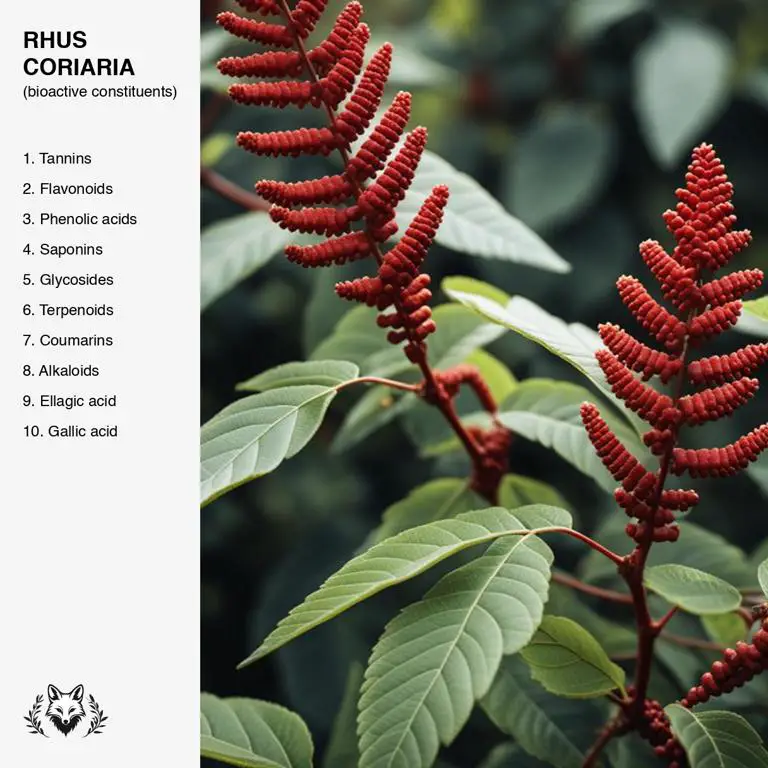
The list below provides more details on what are the major healing constituents of Rhus coriaria and why they are important for health.
- Tannins: Tannins are astringent and antiseptic compounds with anti-inflammatory and antimicrobial properties, capable of constricting tissue and reducing bleeding.
- Flavonoids: Flavonoids are flavonoid glycosides, flavonols, flavanols, flavanones, and flavones, which have antioxidant, anti-inflammatory, and antimicrobial properties.
- Phenolic acids: Phenolic acids are present in Rhus coriaria, exhibiting antioxidant, anti-inflammatory, and antimicrobial properties.
- Saponins: Saponins are water-soluble triterpenoid glycosides found in Rhus coriaria, known for their foaming and emulsifying properties.
- Glycosides: Rhus coriaria Glycosides are reported to exhibit antioxidant and anti-inflammatory properties.
- Terpenoids: Terpenoids are the constituents of Rhus coriaria that have anti-inflammatory, antimicrobial and antioxidant properties.
- Coumarins: Coumarins are a type of organic chemical compound that exhibit anticoagulant, antispasmodic, and anti-inflammatory properties.
- Alkaloids: The Rhus coriaria alkaloids are found in the plant's seeds and may have antioxidant, anti-inflammatory, and antimicrobial properties.
- Ellagic acid: Ellagic acid is a polyphenolic compound with antioxidant, anti-inflammatory, and antimicrobial properties.
- Gallic acid: Gallic acid is a polyphenolic compound with antioxidant, antibacterial, and anti-inflammatory properties.
The table that follows estimates the relative concentrations of the main medicinal constituents contained in Rhus coriaria and lists the most relevant medicinal properties of each constituent based on the corresponding concentrations.
| Constituent | Concentration | Properties |
|---|---|---|
| Tannins | HIGH | Antimicrobial, Antioxidant, Anti-inflammatory, Astringent, Antiseptic, Antibacterial, Fungistatic |
| Flavonoids | HIGH | Antimicrobial, Antioxidant, Anti-inflammatory, Analgesic, Antipyretic, Antihistaminic, Anticancer |
| Phenolic acids | MEDIUM | Antimicrobial, Antioxidant, Anti-inflammatory, Antibacterial, Antifungal, Antiviral, Antiproliferative, Anticancer |
| Saponins | LOW | Antimicrobial, Antioxidant, Anti-inflammatory, Hemostatic, Analgesic, Antiseptic |
| Glycosides | LOW | Antimicrobial, Antioxidant, Anti-inflammatory, Analgesic, Anticancer, Antibacterial, Antiviral |
| Terpenoids | LOW | Antimicrobial, Antioxidant, Anti-inflammatory, Antiproliferative, Antiviral, Anticancer |
| Coumarins | MEDIUM | Antimicrobial, Antioxidant, Anti-inflammatory, Anticancer, Antithrombotic, Antiviral, Hepatoprotective, Neuroprotective |
| Alkaloids | LOW | Antimicrobial, Antioxidant, Anti-inflammatory |
| Ellagic acid | MEDIUM | Antimicrobial, Antioxidant, Anti-inflammatory, Cytotoxic, Anticancer, Anti-hypertensive, Anti-diabetic, Antiviral |
| Gallic acid | MEDIUM | Antimicrobial, Antioxidant, Anti-inflammatory, Antiviral, Antifungal, Analgesic, Antipyretic, Antibacterial, Anticancer, Neuroprotective |
What are the most used parts of Rhus coriaria in medicine?
The most used parts of Rhus coriaria for medicinal purposes are leaves, fruits, seeds, and roots.
The leaves of Rhus coriaria are rich in flavonoids, tannins, and phenolic acids, which exhibit antioxidant, anti-inflammatory, and antimicrobial properties. The fruits contain flavonoids, ascorbic acid, and anthocyanins, contributing to their antioxidant, anti-inflammatory, and cardiovascular protective effects. The seeds are a source of saponins, which display anti-inflammatory, antimicrobial, and antifungal activities, while the roots are rich in phenolic acids, which have antioxidant, anti-inflammatory, and antimicrobial properties.
These bioactive compounds contribute to the medicinal properties of Rhus coriaria, including anti-inflammatory, antioxidant, antimicrobial, and cardiovascular protective effects.
The following illustration give a summary of the most used parts of Rhus coriaria in medicine.
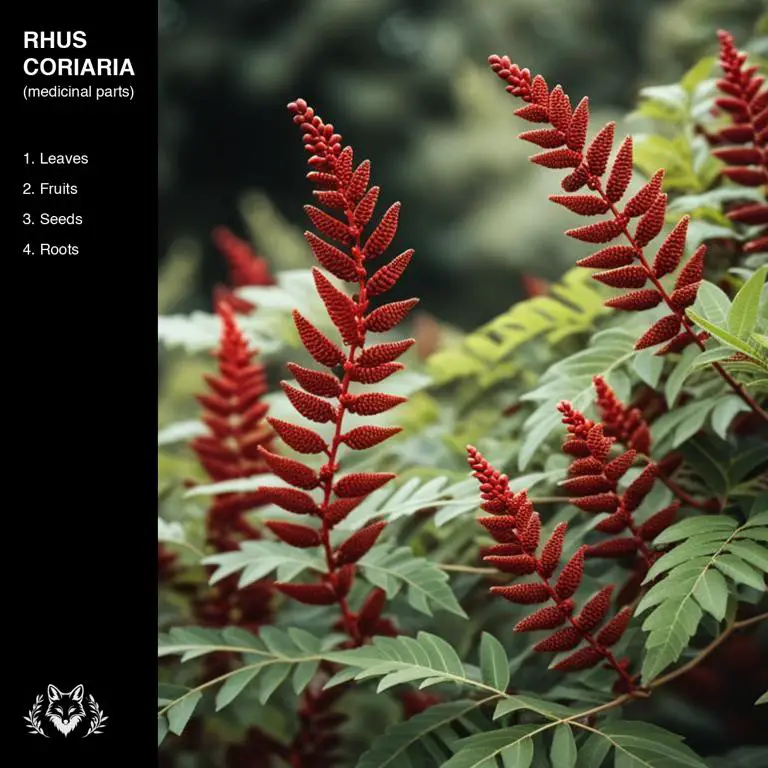
The list below provides more details on what are the most used parts of Rhus coriaria in medicine and why.
- Leaves: The leaves of this plant contain major bioactive compounds such as gallic acid, ellagic acid, and flavonoids, which exhibit anti-inflammatory, antioxidant, and antimicrobial properties, providing primary health benefits including protection against cancer, cardiovascular disease, and neurodegenerative disorders.
- Fruits: The fruits of this plant are rich in gallic acid, ellagic acid, and anthocyanins, which display antioxidant, anti-inflammatory, and antimicrobial activities, leading to health benefits like prevention of cancer, cardiovascular disease, and neurodegenerative diseases, as well as antimicrobial and anti-inflammatory effects.
- Seeds: The seeds of this plant contain major bioactive compounds such as gallic acid, ellagic acid, and flavonoids, which exhibit anti-inflammatory, antioxidant, and antimicrobial properties, providing primary health benefits including protection against cancer, cardiovascular disease, and neurodegenerative disorders, as well as antimicrobial and anti-inflammatory effects.
- Roots: The roots of this plant contain major bioactive compounds such as gallic acid, ellagic acid, and flavonoids, which exhibit anti-inflammatory, antioxidant, and antimicrobial properties, providing primary health benefits including protection against cancer, cardiovascular disease, and neurodegenerative disorders, as well as antimicrobial and anti-inflammatory effects.
The table that follows gives a more complete list of healing constituents found in each part of Rhus coriaria mentioned above.
| Part | Constituents |
|---|---|
| Leaves | Tannins, Phenolic acids, Flavonoids, Gallic acid, Ellagic acid, Saponins |
| Fruits | Gallic acid, Tannins, Ellagic acid, Ellagitannins, Flavonoids, Phenolic acids |
| Seeds | Flavonoids, Saponins, Phenolic acids, Gallic acid, Ellagic acid, Volatile oils |
| Roots | Tannins, Flavonoids, Saponins, Glycosides, Phenolic acids, Sterols |
What are the most common medicinal preparations of Rhus coriaria?
The most common herbal preparation of Rhus coriaria for medicinal purposes are tinctures, which are often used to treat skin conditions such as eczema and dermatitis due to their antiseptic and anti-inflammatory properties.
A salve prepared from the plant's resin is also utilized for its wound-healing properties, as it accelerates the healing process and reduces the risk of infection. Decoctions are sometimes employed for their diuretic and anti-inflammatory effects, helping to alleviate symptoms associated with kidney stones and arthritis. Rhus coriaria is also utilized in the production of ointments, which are applied topically to soothe and calm irritated skin, providing relief from itching and redness.
The plant's medicinal properties are further encapsulated in capsules, which are used to treat gastrointestinal issues such as diarrhea and indigestion due to their anti-inflammatory and antiseptic effects.
The following illustration give a summary of the most common medicinal preparations of Rhus coriaria.
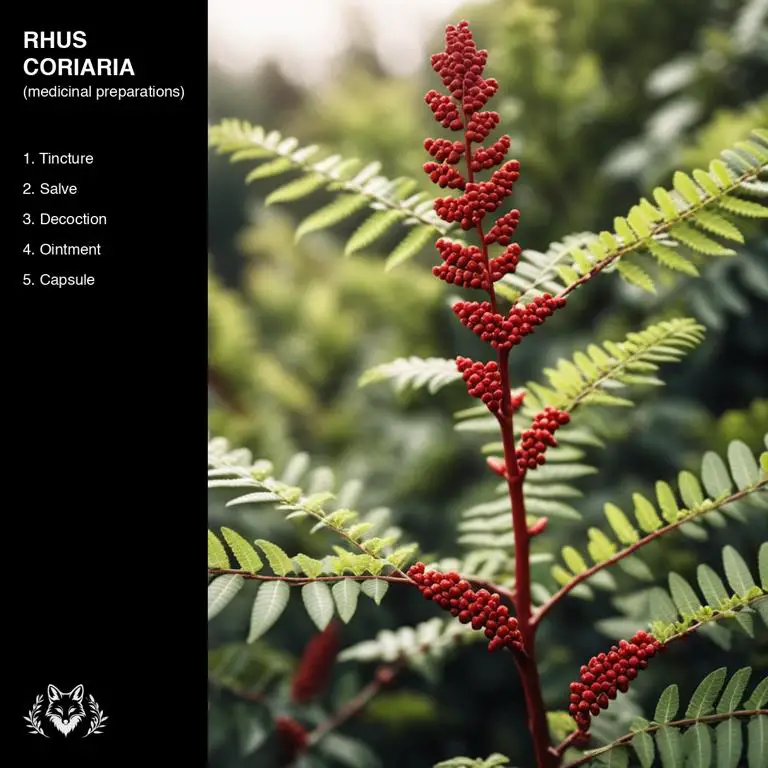
The list below provides more details on what are the most common medicinal preparations of Rhus coriaria and what are their main uses.
- Tincture: Tincture made from this plant is used to treat digestive issues, skin conditions, and inflammation, as a diuretic, and as a remedy for fever and respiratory problems.
- Salve: Salve made from this plant is used to treat skin irritations, wounds, eczema, and other dermatological conditions, with anti-inflammatory and antiseptic properties.
- Decoction: Decoction made from this plant is used to treat fever, rheumatism, and skin conditions such as dermatitis and eczema.
- Ointment: Ointment made from this plant is used to treat skin irritations, itching, eczema and dermatitis due to its anti-inflammatory and antiseptic properties.
- Capsule: Capsule made from this plant is used to treat diarrhea, dysentery, and skin conditions such as eczema and dermatitis.
The table that follows shows what are the most used parts of Rhus coriaria for each medicinal preparation.
| Preparation | Parts |
|---|---|
| Tincture | Fruits, Seeds |
| Salve | Fruits, Seeds |
| Decoction | Fruits, Roots |
| Ointment | Fruits, Seeds |
| Capsule | Seeds, Fruits |
Tincture
Rhus coriaria tincture is a herbal preparation used to treat arthritis, gout, tendinitis, rheumatism and skin irritation, as well as insect bites and warts.
It's commonly used due to its widespread availability and ease of use. One of its most common effects is the reduction of inflammation. Rhus coriaria tincture is made from the fruits and seeds of the Rhus coriaria plant, which are harvested for their medicinal properties.
However, the preparation process is complex and requires careful extraction to ensure the desired compounds are preserved.
Below you find an image of Rhus coriaria tincture.
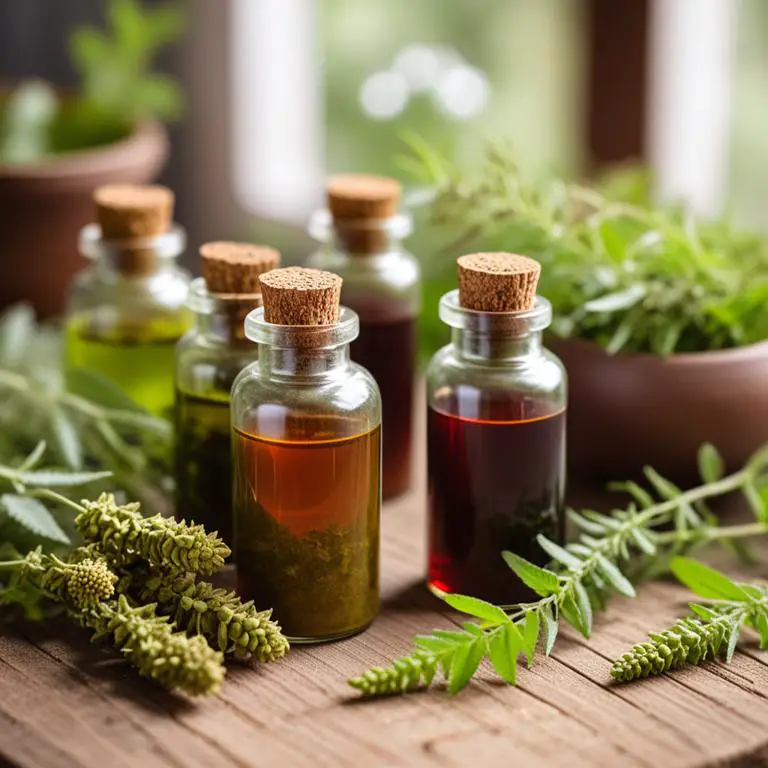
Below you find a 5-step quick procedure to make effective medicinal Rhus coriaria tincture.
- Collect fresh or dried Rhus coriaria fruits and seeds, and clean them thoroughly.
- Combine the cleaned Rhus coriaria fruits and seeds in a clean glass jar, ensuring they are completely submerged in a carrier solvent like vodka or glycerin.
- Seal the jar and store it in a cool, dark place for 2-6 weeks, shaking the jar regularly to facilitate extraction.
- Strain the mixture through a cheesecloth or a coffee filter into another clean glass container, discarding the solids.
- Transfer the resulting herbal tincture to a dark glass bottle, and store it in a cool, dark place to maintain its potency.
Salve
Rhus coriaria salve is a common herbal preparation used to treat various skin conditions including burns, eczema, psoriasis, insect bites, acne, scalp issues, warts, and rosacea.
It's widely used due to its effectiveness in treating these conditions. One common effect of Rhus coriaria salve is its anti-inflammatory action, which helps to reduce redness and swelling in the affected areas. The preparation is made from the fruits and seeds of the Rhus coriaria plant, specifically the dried berries.
However, creating a Rhus coriaria salve is a labor-intensive process as it requires careful collection and drying of the plant parts, followed by a time-consuming extraction process to obtain the active compounds.
Below you find an image of Rhus coriaria salve.
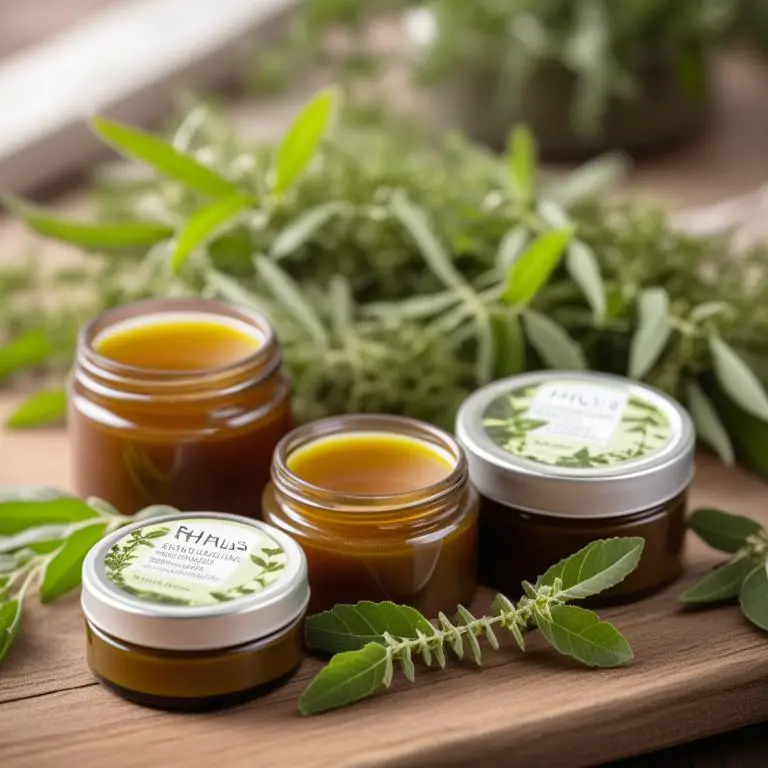
Below you find a 5-step quick procedure to make effective medicinal Rhus coriaria salve.
- Harvest ripe fruits of Rhus coriaria and dry them in a warm, dark place to preserve their properties.
- Dry the seeds of Rhus coriaria and grind them into a fine powder using a mortar and pestle.
- Infuse the dried fruits of Rhus coriaria in a carrier oil, such as olive oil, in a clean glass jar for several weeks, shaking the mixture regularly.
- Strain the infused oil through a cheesecloth or a coffee filter into another clean glass container, discarding the solids and reserving the infused oil.
- Mix the ground seeds of Rhus coriaria with the infused oil and a small amount of beeswax, heating the mixture gently in a double boiler until the beeswax is fully incorporated and the salve has achieved the desired consistency.
Decoction
Rhus coriaria decoction is a common herbal preparation used to treat various health issues, including skin irritation, varicose veins, insect bites, warts, eczema, rheumatism, arthritis, urinary issues, and gout.
It's a frequently used remedy, often found in traditional medicine. The decoction typically has an astringent effect. It's made from the fruits and roots of the Rhus coriaria plant.
The preparation process involves boiling the plant material in water, which is a moderately complex process that requires some skill and attention to detail.
Below you find a 5-step quick procedure to make effective medicinal Rhus coriaria decoction.
- Gather the dried Rhus coriaria fruits and roots, and clean them thoroughly.
- Combine the dried Rhus coriaria fruits and roots in a heat-resistant container.
- Pour enough water over the mixture to cover the herbs, and bring the water to a boil.
- Reduce the heat to a simmer and let the mixture steep for an extended period of time.
- Strain the decoction through a cheesecloth or a fine-mesh sieve into a clean container, discarding the solids.
Ointment
Rhus coriaria ointment is used to treat various skin conditions including scabies, eczema, athlete's foot, ringworm, psoriasis, fungal infections, acne, warts, and herpes.
It's a common preparation in many herbal medicine traditions. Its common effect is anti-inflammatory and antiseptic, helping to reduce itching, redness, and inflammation. The ointment is made from the fruits and seeds of the Rhus coriaria plant, specifically the berries and seed pods, which contain the active compounds responsible for its medicinal properties.
However, the process of making Rhus coriaria ointment is challenging due to the need to extract and purify the active compounds from the plant material, requiring careful preparation and processing to ensure the desired quality and efficacy.
Below you find an image of Rhus coriaria ointment.
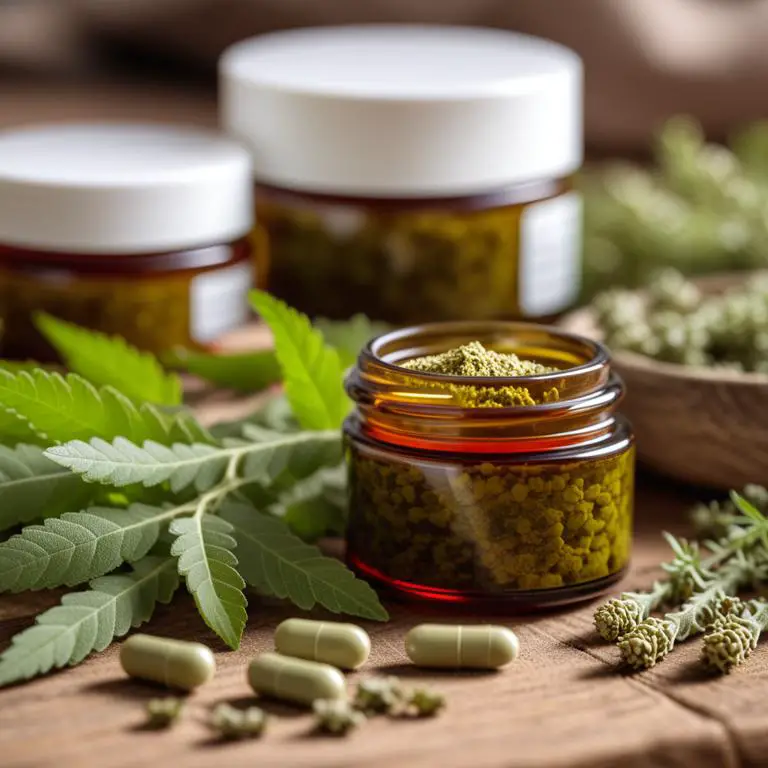
Below you find a 5-step quick procedure to make effective medicinal Rhus coriaria ointment.
- Gather Rhus coriaria fruits and seeds, then clean and dry them thoroughly.
- Mince the dried Rhus coriaria fruits and seeds into a fine powder using a mortar and pestle.
- Mix the powdered Rhus coriaria with a carrier oil, such as olive or coconut oil, in a double boiler.
- Heat the mixture gently over low heat, stirring occasionally, until the oil has fully infused with the herbal properties.
- Strain the infused oil through a cheesecloth or coffee filter into a clean container, then store the ointment in a cool, dark place.
Capsule
Rhus coriaria capsule is a herbal preparation commonly used to treat various conditions including skin irritation, gout, arthritis, rheumatism, joint pain, inflammation, allergy, and diabetes.
It is widely available and commonly used due to its efficacy in alleviating symptoms of these conditions. The preparation is known to have a common effect of reducing inflammation and pain, making it a popular choice for those seeking natural relief. The Rhus coriaria capsule is typically made with the seeds and fruits of the Rhus coriaria plant, which are rich in active compounds that contribute to its therapeutic properties.
The process of making this preparation is moderately difficult, requiring careful processing and quality control to ensure the optimal extraction of its active ingredients.
Below you find a 5-step quick procedure to make effective medicinal Rhus coriaria capsule.
- Harvest the ripe fruits of Rhus coriaria and dry them thoroughly.
- Extract the seeds from the dried fruits and clean them thoroughly.
- Dry the extracted seeds in a low-temperature oven or in the sun to remove any moisture.
- Grind the dried seeds into a fine powder using a grinder or mortar.
- Fill empty herbal capsules with the ground seed powder and seal them tightly.
What are the possible side effects of Rhus coriaria if used improperly?
The most common side effects Rhus coriaria gives people when used improperly are listed below, along with a brief explanation.
- Experiencing Nausea: Consuming Rhus coriaria causes nausea due to its tannin and gallic acid content.
- Developing Diarrhea: Ingestion of Rhus coriaria causes gastrointestinal irritation leading to diarrhea.
- Suffering From Abdominal Pain: Ingestion of Rhus coriaria causes gastrointestinal irritation leading to abdominal pain due to the presence of anthraquinones.
- Experiencing Vomiting: Ingestion of Rhus coriaria causes severe gastric irritation and vomiting.
- Showing Allergic Reactions: Contact dermatitis, urticaria, and anaphylaxis occur after Rhus coriaria exposure.
- Experiencing Dizziness: Prolonged consumption of Rhus coriaria can cause a decrease in blood pressure leading to dizziness due to a compound called gallic acid which acts as a vasodilator.
- Facing Increased Bleeding: Rhus coriaria extracts can cause increased bleeding due to their anticoagulant properties.
- Experiencing Seizures: Ingestion of Rhus coriary seeds can cause convulsions, which may progress to seizures due to the presence of toxic compounds, particularly anacardic acids and cardol.
- Showing Kidney Damage: Prolonged consumption of Rhus coriaria berries can cause irreversible kidney damage due to the presence of gallic acid and its derivatives which are nephrotoxic.
- Experiencing Liver Damage: Prolonged ingestion of Rhus coriaria may cause liver damage and cirrhosis due to gallic acid and tannin toxicity.
What are the precautions to take before using Rhus coriaria medicinally?
The precautions to take before using Rhus coriaria medicinally are use under medical supervision, as it may interact with other medications or exacerbate underlying health conditions.
Avoid internal use, as the seeds and leaves of the plant contain toxic compounds that can cause gastrointestinal problems and other adverse effects. Consult allergy history, as individuals with allergies to plants in the Anacardiaceae family may experience severe reactions to Rhus coriaria. Use in moderation and monitor blood pressure, as excessive consumption may lead to cardiovascular complications and hypertension.
Additionally, avoid during pregnancy and breastfeeding, be aware of interactions with other medications, start with low doses, avoid prolonged use, and seek help for side effects, as they can occur even at recommended dosages.
The most important precautions you must take before using Rhus coriaria for medicinal purposes are listed below, along with a brief explanation.
- Use Under Medical Supervision: Contraindicated in patients with liver or kidney disease due to potential toxicity from anthraquinones.
- Avoid Internal Use: Ingestion of Rhus coriaria causes severe gastrointestinal distress and allergic reactions.
- Consult Allergy History: Individuals with known allergies to Anacardiaceae family members should consult their allergy history before handling Rhus coriaria.
- Use In Moderation: Excessive consumption of Rhus coriaria causes gastrointestinal irritation and diarrhea.
- Monitor Blood Pressure: Regular monitoring of blood pressure is required due to Rhus coriaria's tannin content, which can affect blood pressure regulation.
- Avoid During Pregnancy And Breastfeeding: Constituents of Rhus coriaria may cause uterine contractions and premature birth, posing risk to fetus and newborn.
- Be Aware Of Interactions: Rhus coriaria interacts with certain medications, including blood thinners, and decreases their effectiveness.
- Start With Low Doses: Initial intake should be limited to small amounts due to potential toxicity.
- Avoid Prolonged Use: Prolonged use of Rhus coriaria extracts may cause tannin toxicity and other adverse effects, such as gastrointestinal issues, kidney damage, and liver damage.
- Seek Help For Side Effects: Severe allergic reactions, including anaphylaxis, occur with Rhus coriaria use.
